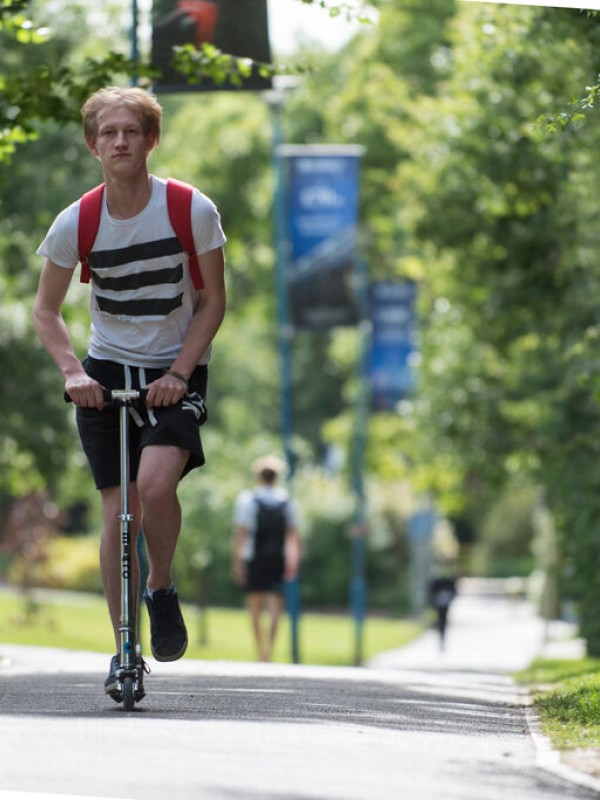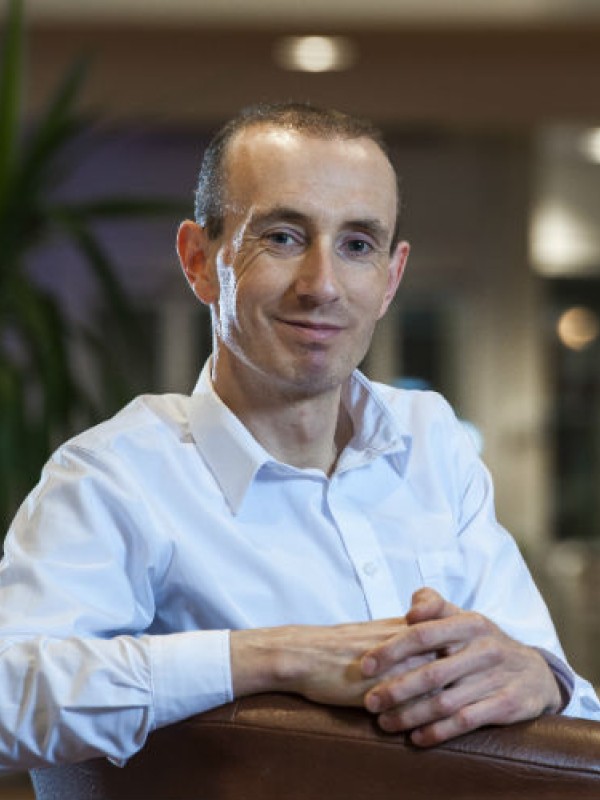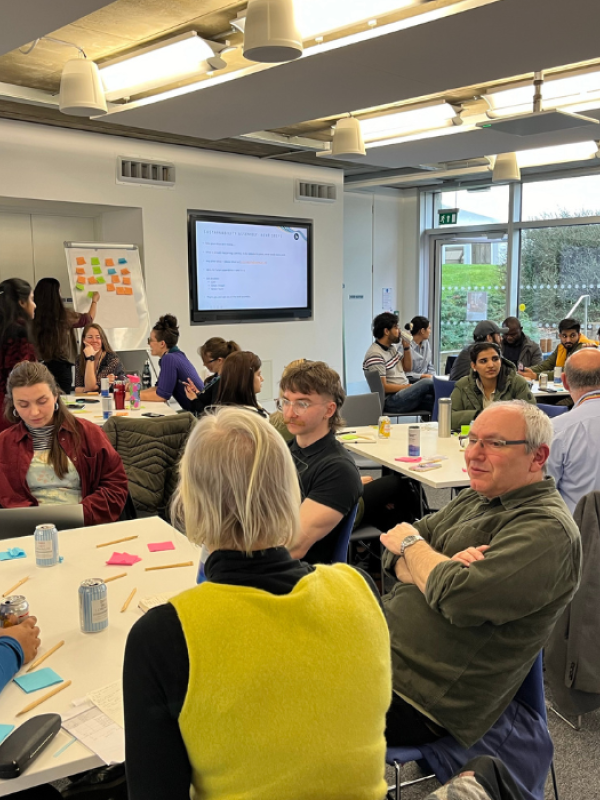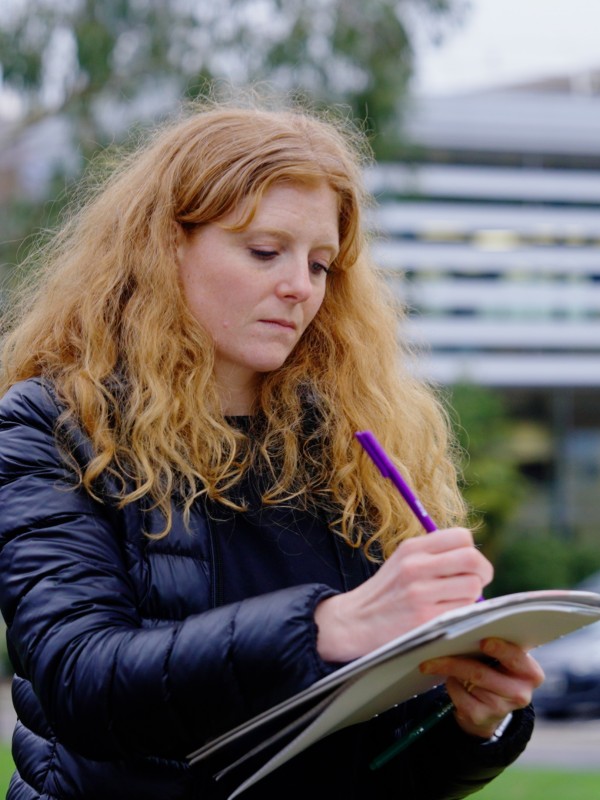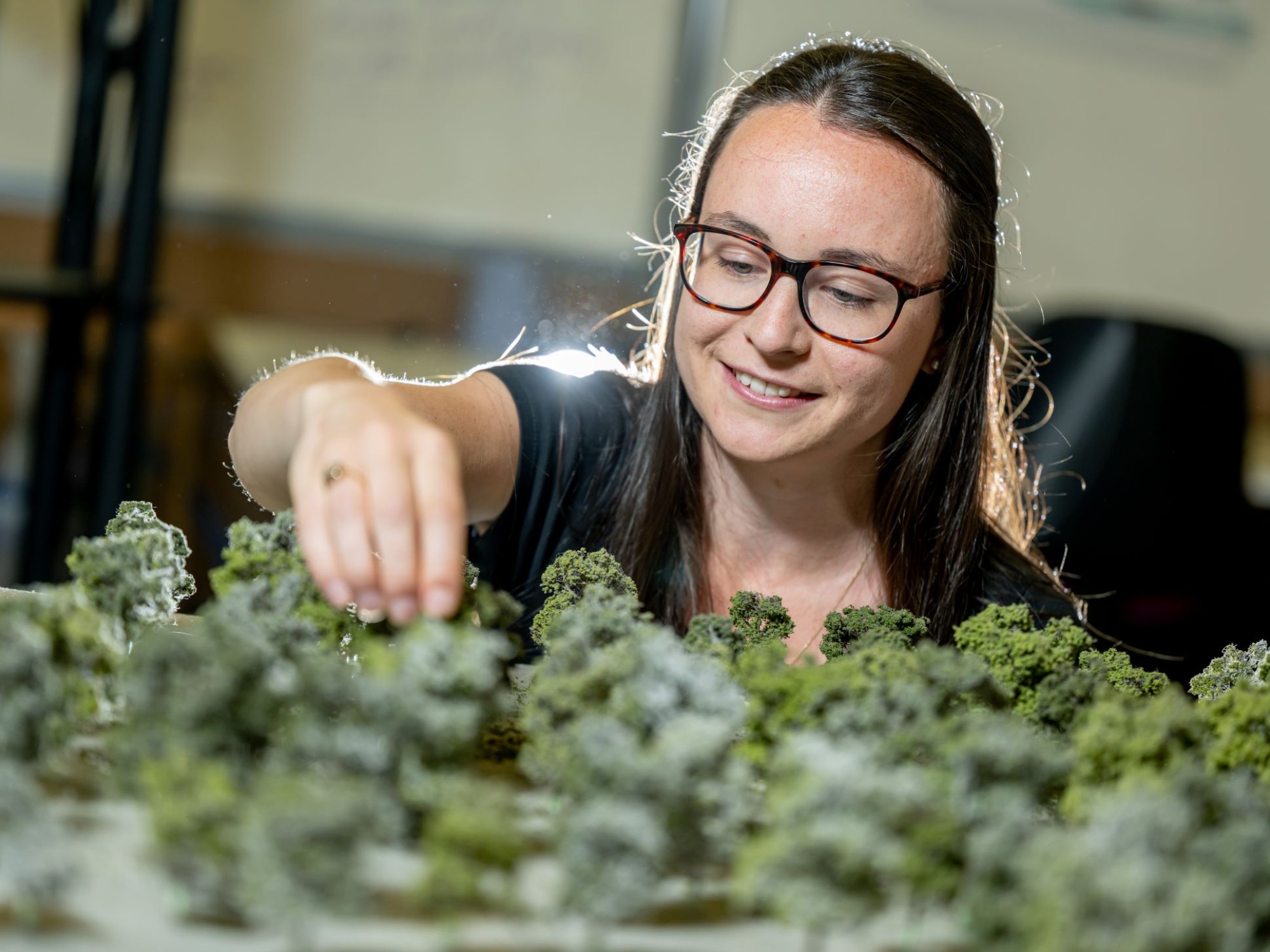
- Sustainable Development with Industrial Practice
MSc — 2025 entry Sustainable Development with Industrial Practice
Our Sustainable Development with Industrial Practice MSc degree offers a comprehensive exploration of the principles, policies, and practices needed to address the complex challenges of sustainability. Graduates of this course are prepared to address the strategic challenges confronting businesses, individuals, and governments, and to enact the necessary changes to safeguard our planet.
2,701+ people have created a bespoke digital prospectus
Why choose
this course?
Our MSc provides you with the knowledge to help organisations move towards a greener future. It examines the societal transformations required to tackle the climate emergency, protect the environment, and shift towards sustainable consumption and production – as outlined by the United Nations’ Sustainable Development Goals.
This course is run by our Centre for Environment and Sustainability (CES) and the Institute for Sustainability, and in partnership with the new Surrey CIFAL – a United Nations Institute for Training and Research (UNITAR) training centre recently established at the University of Surrey.
Sustainable development graduates are equipped to tackle the strategic challenges being faced by companies, individuals and governments, and implement the changes required to protect our planet.
You'll also have the opportunity to undertake a postgraduate placement year, allowing you to gain crucial workplace experience. We’ll support you in finding a placement with a company most suited to your career goals.
Statistics
96%
Of our postgraduate taught students go on to employment or further study (Graduate Outcomes 2024, HESA)
Accreditation

What you will study
Questioning what you thought you knew about sustainability and the environment, we’ll inspire you to face some of society’s biggest sustainability challenges.
We’ll provide insight into the latest thinking in numerous important areas, covering the essentials needed to analyse the relationship between environmental issues and human society. As part of this approach, you’ll evaluate political, socio-economic, ethical, cultural and regulatory frameworks, and acquire an understanding of the theory and application of sustainable development, while developing a sensitive appreciation of the issues surrounding it.
On this course you will hear from external speakers from industry, government and non-governmental organisations who are active in establishing sustainable development. It also provides a route to the Institute of Environmental Management and Assessment graduate membership.
Guest lecturers
High-profile guest lecturers assist with the teaching of some modules. We make maximum use of guest lecturers, drawing on the practical skills and experience of important experts from government and industry to complement the theoretical components of the modules offered.
Recent guest speakers have come from leading organisations such as:
- Ardent Consulting Engineers
- Aviva Investors
- Climate Action
- Ikea
- Keller
- Modulaire Group
- Natural England
- NHS Property Services
- Sony Computer Entertainment
- Surrey Wildlife Trust
- United Nations Environment Programme
- WRAP.
The extensive expertise of CES academics and researchers is also drawn upon in modules.
Students must complete five compulsory modules and four elective modules by the end of their MSc. The dissertation forms one of the compulsory modules.
You can start this course at the beginning of either the first semester in September or the second semester in February.
The academic year begins with an induction week when students are introduced to the University and choose their elective modules.
You will work on your dissertation in Semester 2 and in the summer if you start your course in September. If you start your course in February, we encourage you to work on your dissertation in Semesters 1 & 2 and the summer. You’re free to choose your own dissertation topic and a series of seminar events will be held to help you refine your ideas and make a start. Most students choose topics related to issues or ideas encountered in the taught modules, or in a professional context, which relates to environment or sustainability. You’ll be allocated a dissertation supervisor to help guide you through the dissertation process.
The structure of our programmes follows clear educational aims that are tailored to each programme. These are all outlined in the programme specifications which include further details such as the learning outcomes:
General course information
Contact hours
Contact hours can vary across our modules. Full details of the contact hours for each module are available from the University of Surrey's module catalogue. See the modules section for more information.
Timetable
Course timetables are normally available one month before the start of the semester.
Each module on this course is taught on an intensive modular basis. There is pre-reading to do for each module and, on occasion, a pre-module assessment, followed by an intensive teaching week. During this week, you will have several classes each day, from approximately 9am to 5pm, Monday to Friday. Post-module coursework is to be completed over the four-week period after the intensive week.
View our code of practice for the scheduling of teaching and assessment (PDF).
Location
This course is based at Stag Hill campus. Stag Hill is the University's main campus and where the majority of our courses are taught.
We offer careers information, advice and guidance to all students whilst studying with us, which is extended to our alumni for three years after leaving the University.
Graduates of this course go on to pursue a diverse range of careers, implementing sustainable development and dealing with the real environmental challenges facing humanity.
Studying on this MSc could lead to roles such as:
- Energy efficiency officer for a local government
- Environmental officer in a multinational chemical company
- Environment consultant for an engineering consultancy
- Sustainability adviser for a multinational company
- Programme officer with a sustainability charity.
Other graduates use the research skills they develop to study for PhDs.


George S.
Graduate - Sustainable Development MSc
"I believe the course provided me with a deep understanding of various sustainability-related issues and this helped me massively in finding a job. I have had two jobs since finishing the course and I currently work as an Energy and Sustainability Reporting Manager."


Rebecca V.
Graduate - Sustainable Development MSc
"The true standout for me has been the friends I made during my time here. Since Surrey attracts such a diverse student body, I enjoyed meeting people from all walks of life and made friendships that will last a lifetime!"
UK qualifications
A minimum of a 2:2 UK honours degree, or a recognised equivalent international qualification.
Relevant work experience may also be considered.
English language requirements
IELTS Academic: 6.5 overall with 6.0 in writing and 5.5 in each other element.
These are the English language qualifications and levels that we can accept.
If you do not currently meet the level required for your programme, we offer intensive pre-sessional English language courses, designed to take you to the level of English ability and skill required for your studies here.
Recognition of prior learning
We recognise that many students enter their course with valuable knowledge and skills developed through a range of ways.
If this applies to you, the recognition of prior learning process may mean you can join a course without the formal entry requirements, or at a point appropriate to your previous learning and experience.
There are restrictions for some courses and fees may be payable for certain claims. Please contact the Admissions team with any queries.
Placements
This two-year MSc includes a placement year which enables you to gain invaluable professional experience working within an organisation.
After a year of full-time study at Surrey, you'll spend up to an additional 12 months on placement. You'll be responsible for securing your own placement, but we’ll support you in your search with a series of employability workshops and individual coaching.
We work closely with potential employers to help facilitate your successful placement. In addition to this, our award-winning Employability and Careers team are always ready to help, and they can provide you with a range of specialist resources and advice.
Our Sustainable Development students have done their placements at companies including:
- Brodie Consulting Ltd
- Climate Bonds Initiative
- Derbyshire NHS
- Global Action Plan, London
- Guildford Environmental Forum
- Hammersmith & Fulham Council
- Hubbub
- Klimato, Sweden
- LC Energy Ltd
- Modulaire Group Holdings, Ltd, London
- Surrey County Council.
Study and work abroad
There may be opportunities to acquire valuable experience by working or conducting research abroad during your degree or shortly afterwards. It is possible to do this in the summer period with the Turing Scheme working on your dissertation or as a recent graduate.
Turing Scheme grants are available to support placements of between four weeks to 12-months.
Scholarships and bursaries
Discover what scholarships and bursaries are available to support your studies.
Fees
Explore UKCISA’s website for more information if you are unsure whether you are a UK or overseas student. View the list of fees for all postgraduate courses.
September 2025 - Full-time (with placement) - 2 years
- UK
- £13,550
- Overseas
- £26,050
February 2026 - Full-time (with placement) - 2 years
- UK
- £13,550
- Overseas
- £26,050
- The fee stated above will be charged in Year 1 of the programme and a fee of £1,850 is payable in Year 2 of the programme
- Once enrolled, students who decide to change from the two-year with placement course to the one-year full time course will not be entitled to a refund of the difference in course fees between the one-year full time course and the first year of the two-year with placement course
- These fees apply to students commencing study in the academic year 2025-26 only. Fees for new starters are reviewed annually.
Payment schedule
- Students with Tuition Fee Loan: the Student Loans Company pay fees in line with their schedule (students on an unstructured self-paced part-time course are not eligible for a Tuition Fee Loan).
- Students without a Tuition Fee Loan: pay their fees either in full at the beginning of the programme or in two instalments as follows:
- 50% payable 10 days after the invoice date (expected to be October/November of each academic year)
- 50% in January of the same academic year.
- Students on part-time programmes where fees are paid on a modular basis: cannot pay fees by instalment.
- Sponsored students: must provide us with valid sponsorship information that covers the period of study.
The exact date(s) will be on invoices.
Additional costs
Commuting (local travel expenses): Unable to specify amount - Potential travel costs for the dissertation if the student’s topic requires travel to case study sites.
Funding
You may be able to borrow money to help pay your tuition fees and support you with your living costs. Find out more about postgraduate student finance.
Apply online
To apply online first select the course you'd like to apply for then log in.
Select your course
Choose the course option you wish to apply for.
Sign in
Create an account and sign into our application portal.
Please note that we may have to close applications before the stated deadline if we receive a high volume of suitable applications. We advise you to submit your application as soon as it is ready.
ApplyPlease note that we may have to close applications before the stated deadline if we receive a high volume of suitable applications. We advise you to submit your application as soon as it is ready.
ApplyAdmissions information
Once you apply, you can expect to hear back from us within 14 days. This might be with a decision on your application or with a request for further information.
Our code of practice for postgraduate admissions policy explains how the Admissions team considers applications and admits students. Read our postgraduate applicant guidance for more information on applying.
About the University of Surrey
Need more information?
Contact our Admissions team or talk to a current University of Surrey student online.
Terms and conditions
When you accept an offer to study at the University of Surrey, you are agreeing to follow our policies and procedures, student regulations, and terms and conditions.
We provide these terms and conditions at offer stage and are shown again at registration. You will be asked to accept these terms and conditions when you accept the offer made to you.
View our generic registration terms and conditions (PDF) for the 2025/26 academic year, as a guide on what to expect.
Disclaimer
This online prospectus has been published in advance of the academic year to which it applies.
Whilst we have done everything possible to ensure this information is accurate, some changes may happen between publishing and the start of the course.
It is important to check this website for any updates before you apply for a course with us. Read our full disclaimer.
Subject to validation
This programme is subject to approval. This means that it has received initial agreement from the University and is currently undergoing a detailed final approval exercise, through the University’s quality assurance processes.
These processes are a requirement for all Higher Education Institutions within the UK, to ensure that programmes are of the highest standard. Occasionally there may be instances where the University may delay or not approve the introduction of the programme.
